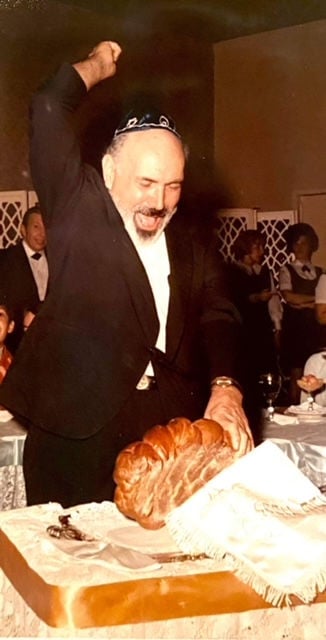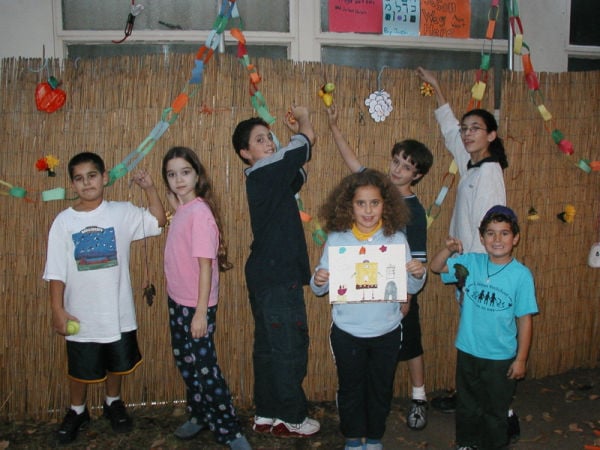The Brooklyn neighborhood of Hilda Jaffe’s childhood was majority Italian, with primarily Jewish shopkeepers and merchants; when Jaffe moved to Verona in 1948, she found her childhood neighborhood in microcosm, a small town with a majority Irish-Italian population served by a small, insular community of Jewish merchants. “I guess it is strange,” she says, “the similarities between then and when I moved.” But, it’s not only in Jaffe’s story that the past, near-past, and present seem to be tangled together, the new looking as the old and the old seeping into the veins of the new. Verona’s Jewish community is a piece of history that, no matter how much its circumstances have changed, still remains a fundamental part of the town and its culture. Its presence has been reserved, its size modest. But through its story, it’s possible to not only peer into Verona’s past, but look ahead to its future.
In many respects, the story of Verona’s Jews is the story of American Jewry at large: Prior to World War II, many Jews in the New Jersey suburbs were merchants, catering to a largely non-Jewish clientele. “In the early days, there really weren’t many Jews here,” says Rolfe Evenson, a member of Verona’s original Jewish community. “It was the Depression then. The only Jews in town were some of the storekeepers — in fact, my family owned a general store, Evenson’s, back in the day, and we lived in the same building as it.” Evenson’s general store is no more, its space on Bloomfield Avenue now occupied by Crossfit gym Mud Sweat Tears and Say I Do Bridal Bouquet. But, in its time, Evenson’s — along with Terry’s Drug and Cohen’s general stores — was one of Verona’s landmark Jewish-owned businesses.

Jews in pre-War Verona lacked a sense of shared communal identity, however, until the arrival of Rabbi Alter Kriegel. “Rabbi Kriegel gave us a sense of pride,” says Evenson, “since he was head of the synagogue, Beth Ahm.”
Congregation Beth Ahm was founded in 1937, although the synagogue didn’t move into its Grove Avenue location until 1950. Pre-war, the synagogue proved to be a lifeline for Verona’s Jewish community, especially as it resisted antisemitism in town. “There was no organized movement against Jews here, let me make that clear,” says Evenson. “But it doesn’t mean that there weren’t issues. You’d find a swastika painted somewhere, including on the [old Bloomfield Avenue location of] the synagogue.” Evenson describes the oft-surreal atmosphere surrounding Verona’s Jews, whose businesses supported their community and whose religion and ethnicity made them targets for prejudiced people: “You’d have someone come into the store, someone hostile to Jews, but they still bought from us, because you had to buy from us; but, I’d leave the store, and get beaten up.” With Rabbi Kriegel in town, though, Verona’s Jews were able to come together as a community for the first time, and find pride in their religion and ethnicity — and this sense of community would only be bolstered in the years following World War II.
“In Verona, you had a post-war boom of housing construction,” notes Jaffe. “So, families moved out of the cities into the new housing — and Jewish families came to Verona because of the school system.” Jaffe recalls how older Jewish families would come to welcome new Jews in town. “Our Lady of the Lake, the church, they’d do a welcome-wagon for new residents, but only for Catholics — Beth Ahm did the welcome-wagon for Jewish families.”
“There was no organized movement against Jews here … but it doesn’t mean that there weren’t issues”
Jewish migration to Verona accelerated in the post-war years, as Jewish families from Newark and New York City moved to surrounding suburbs in the wave of post-war white flight. “Verona’s Jewish population really peaked in the early ’60s,” says Jaffe. “The population might have been about 10 percent, 12 percent Jewish.” Even as Jews gained numbers in town, though, and were active participants on Town Council and the Board of Education (on which Jaffe served), hostility and prejudice from the pre-war days remained. “In those days, the school superintendent was a known antisemite,” says Jaffe. “Before me, there’d been another Jewish woman on the board, and she told me to watch out for him.”
Verona’s Jews remained in an uneasy equilibrium throughout the 1960s. The community largely stuck to itself, the Jewish population concentrated on Woodland Avenue and Brentwood Drive as a result of redlining policies that segregated new homeowners based on race and ethnicity. (Black families were also redlined, to Martin Road and a strip of Pompton Avenue.) “You knew who was Jewish and who wasn’t,” says Evenson, “and you stayed away from certain houses.”
A turning point for Verona’s Jewish community came in 1969, however, with Verona’s one-year experiment in busing Black elementary school students in from Newark — an effort spearheaded by Jaffe. In her 2019 discussion on on the busing program at Verona High School, Jaffe recalled how supporting the program “put a target on my back,” and how racial prejudice bled into antisemitism. “People were knocking on my door, yelling at my house, because I was the ‘Jewish bitch’ who supported the program,” Jaffe says. “At one point, I thought I was going to get a cross burned on my lawn.”
The busing fight left lasting scars on the Verona community, and included Jaffe’s own withdrawal from public service. 1969, however, also began to mark the decline of Verona’s Jewish community, as families moved further west into Livingston, Morris County, and beyond. For those who remained the push to assimilate became stronger. The country was charting a path forward in a post-Civil Rights era: redlining was now illegal as a result of the Fair Housing Act of 1968; Jewish families were now second and third generation Americans; Jews in town moved away from shopkeeping and toward other professions. “I guess I’d say my generation was a little bit more assimilationist,” says Jessica Pearson, a lifetime Jewish resident of Verona. “In the ’70s, ’80s, I think we really just wanted to get along with our neighbors, maybe more so than my parents’ generation.”
“I guess I’d say my generation was a little bit more assimilationist”
Was there prejudice? “Yeah, sure,” Pearson adds. “But you just had to keep walking, you had to be resilient. You knew who to stay away from, and you just hung out with people you liked.”
Pearson recalls having a diverse group of friends at Verona High School, something that could’ve only been dreamed of by past Jewish generations who’d faced hostility from some in town, a population that was (and remains) largely Catholic and Irish-Italian. “I went to Hebrew school at Beth Ahm,” says Pearson. “But being Jewish? I was absolutely proud to be Jewish, but it was really much more of a cultural thing, what we expressed in my house.” Secularism for Verona’s Jews had been a constant since the 1930s, but the push to assimilate was new, and it came alongside the decline of Congregation Beth Ahm.
“You know what the problem was? We didn’t have a parking lot,” says Jaffe, whose husband served as the synagogue’s president in the early ’70s. Jaffe recalls how “since we didn’t have a parking lot, people didn’t want to come to us. It was inconvenient for them.” As Verona’s Jews migrated out of the town, Jaffe recollects the difficulty present in attracting new members to the congregation; Beth Ahm was forced to compete with larger, more established synagogues, such as Agudath Israel in Caldwell and Shomrei Emunah in Montclair, that proved more attractive for young families. “The young people would want to go where there were other young people,” says Jaffe.

Congregation Beth Ahm closed in 2018, its former building now the site of the Islamic Center of Verona, and its former congregants now absorbed into Congregation B’nai Shalom in West Orange. And yet, even as Verona’s Jewish population shrunk, even as Jews in Verona and around the country further assimilated and secularized, there are still Jews in Verona — and a new generation hoping to change the way Jews are seen in town and beyond.
In some respects, it’s almost eerie the degree to which the experience of Verona’s Jewish population today mirrors that of Jews in every decade past: that of a largely secular community drawn together by a shared identity, who, while not aggressively and systemically discriminated against, still faces ignorance and prejudice. “Honestly, I think it’s important that parents educate their kids, show them that being different is okay,” says Sarah Cole, a member of VHS’s class of 2021. “Because some of what I’ve heard from people has been totally unacceptable. One time in class, someone asked my teacher if all Jews were actually rich.” Cole notes that what hostility she’s faced has fortunately been limited, and never violent. But, she says, “there’s still so much ignorance. If you don’t express what makes you different, that your traditions are different, then you’re fine. But when you do something from your culture, then people will start to notice, and say things to you.”
Griffin Willner, also from the class of 2021, concurs. “For a while, I really didn’t try to connect with my Jewish heritage, because it’s just easier not to. But I am ethnically Jewish, and lately, I’ve realized I’m proud of my heritage.”
“Lately, I’ve realized I’m proud of my heritage”
“I’m absolutely proud to be Jewish,” says Cole. “I think it really is important to be proud of what makes you different, and I want to help keep my culture alive.” In other words, Cole and Willner aren’t pushing for assimilation: they, like members of other minority communities, see a future in which diversity is not only tolerated, but actively embraced and celebrated. And in an age in which Jews compose only 2.4% of the U.S. population, but are the targets of 60% of religiously motivated hate crimes, an embrace of diversity might be more crucial than ever.
“Some people say that Jews are just making themselves the victims,” says Willner. “But antisemitism is still a problem, and we have to fight it.”
Verona’s Jewish community stands as a small piece of the American Jewish experience, and Jews form a small percentage of Verona’s already modest population. Verona’s Jewish community has remained, however — and in the remembrance of the past, hopes to illuminate the path ahead. “I do want things to change here,” says Cole. “And honestly? I think people are getting more accepting today, especially this generation, even though there’s still problems. I’m hopeful for the future here.”



Thank you for this comprehensive article. As a person of Eastern European heritage who is married to someone who grew up culturally Jewish, it’s important to be aware of history – and the need to be vigilant against bigotry in general and antisemitism in specific. We are all humans and share much in common – and I know these are beliefs dear to those I’ve met and befriended here in Verona!
– Dr. John Gasiewski
Thanks for the article.. Brought back great memories like studing for my bar mitzvah on a record produced by Rabbi Kriegel. He was ahead of his time wearing a cow boy around town. I also remember helping setting up for the sisterhood bazaar. I was always amazed at the volumn of merchandise the Oremland’s would donate
When I was in Hebrew school I rennet learning Jewish songs. Unfortunately, that wasn’t the case from my kids who attended Hebrew school here in Atlanta Georgia.